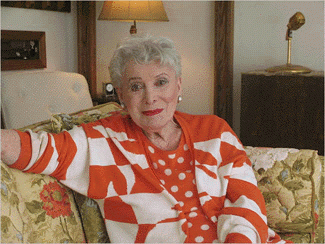You think Lily Tomlin is funny? You think Phyllis Diller is risque? You think Whoopi Goldberg is a pioneer? You think Carol Burnett is a legend? You think Joy Behar's got spunk and Rita Rudner has style?
Every single one of those women and all the female stand-up comics you ever saw got their foot in the door because Jean Carroll kicked it wide open.
Don't confuse her with E. Jean Carroll, the writer from Elle Magazine. This Jean Carroll was America's first female stand-up comic to make it as a star. That's how the New York Times described her back in 2006 when the Friars Club honored her for her lifetime of work. Like a lot of trailblazers in the entertainment industry, she started her career at a young age and just made it up as she went along. It's only at the end, when you look back, that you realize how much impact she had.
Jean Carroll got her start in vaudeville. The only other female comic even close to her pioneering status would be Moms Mabley. Unfortunately, America in those days was a heavily segregated society and Moms, being black, was limited to the chitlin circuit for most of her career. It wasn't until she started playing the Playboy Club that she broke into mainstream awareness.
Carroll wasn't as "blue" as Mabley, but she was every bit as funny. Unlike Lucille Ball or Phyllis Diller, she didn't fabricate a ditzy on-stage persona to disarm the crowd. Unlike Gracie Allen, she didn't need a straight man to balance her act. She just came out dressed in a mink and dripping diamonds, then took command of the room with nothing more than a microphone and her wit. It's hard to explain to the current generation of post-feminist women how subversive that was. Writing for The New York Times, Jane Wollman Rusoff, nailed it when she wrote
At the time Ms. Carroll was often accused of competing with male comics. "It never occurred to me that only men were supposed to talk," she now said dryly, paging through a thick scrapbook of clippings.
While men were constantly getting laughs with routines that made their wives the butt of the joke, Carroll was putting the shoe on the other foot and coming up with lines like this one:
The thing that attracted me to my husband was his pride.
I'll never forget the first time I saw him,
standing up on a hill,
his hair blowing in the breeze.
He was too proud to run and get it.
That was the kind of material that made her a regular on Ed Sullivan's show. For awhile, he had her signed to an exclusive contract that brought her $10,000 a show. That was unheard of at the time. The kind of comics that got that kind of money were Milton Berle, Bob Hope, or Jack Benny. She was that good.
Now a lot of people might dismiss this woman as merely an entertainer. But like everything else she did, she was ahead of her time. She was a feminist before they invented the term. She didn't read about it. She didn't get taught about it. It was a conscious choice she made as an 8 year old child when she saw her father, an abusive alcoholic, hurl burning-hot food at her mother.
"She was up against the wall like a trapped animal. I thought: "She's not fighting back because she has no place to go. He pays the bills. I have to grow up in a hurry and work, so I can take care of my mother.' I decided that I'd never be beholden to a man."
By the time she was 12 years old, she was a professional singer-dancer in vaudeville. The money she made supported her family. She was amazed her mother allowed her to do it. As she explained to Bill Smith when he interviewed her for his book, The Vaudevillians
[That] floored me because there was nothing more important to my mother than my education. But everybody agreed I was smart so it didn't matter whether I went to school or not.
If that doesn't convince you they had different standards for women back in the early 20th century, I don't know what will.
The stand-up comedy routine developed over time but didn't really flourish until the 30s. Carroll and her husband, Buddy Howe, were working their vaudeville song and dance routine in Britain. They had gone over in 1936 for a six week engagement and wound up staying for three years. The war broke out, Buddy got drafted and Jean had to do her act solo. By the time the war ended, Buddy came back and realized that joining her act would just hold her back. He quit performing and went on to become a successful talent agent.
(Note: You can view every article as one long page if you sign up as an Advocate Member, or higher).






